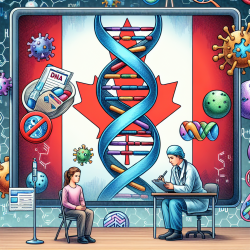Understanding the Legal Landscape
In Canada, HGGE is considered a criminal offense under the AHRA. The Act prohibits altering the genome of a human cell or embryo in a way that the alteration can be transmitted to descendants. Violations can result in hefty fines and prison time. Despite this, there is a growing momentum to reconsider these prohibitions, driven by the potential benefits HGGE offers, especially for those affected by rare, monogenic diseases.Why Should Practitioners Care?
Rare diseases often present unique challenges, including:- High morbidity and mortality rates
- Limited access to therapies
- Frequent misdiagnosis and diagnostic odysseys
- Social stigma and isolation
- Financial burdens
Data-Driven Decisions in Therapy
Incorporating data from recent studies on HGGE can help practitioners make informed decisions. The research article "Human germline genome editing is illegal in Canada, but could it be desirable for some members of the rare disease community?" provides a comprehensive overview of the legal, ethical, and social implications of HGGE. By understanding these aspects, practitioners can better advocate for their patients and potentially influence policy changes that could improve access to advanced therapies.Encouraging Further Research
The rare disease community is often underrepresented in scientific literature, yet they stand to benefit significantly from advancements in genome editing. Practitioners can play a crucial role by:- Encouraging participation in clinical trials
- Advocating for more inclusive research
- Staying informed about the latest scientific developments
Conclusion
While HGGE remains illegal in Canada, understanding its potential and the legal context can help practitioners better serve their patients. By staying informed and advocating for change, we can work towards a future where advanced therapies are accessible to all who need them.To read the original research paper, please follow this link: Human germline genome editing is illegal in Canada, but could it be desirable for some members of the rare disease community?










